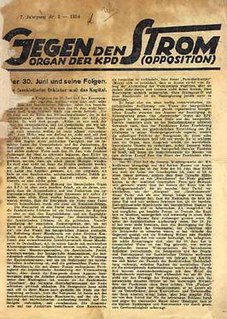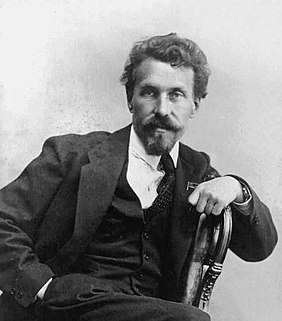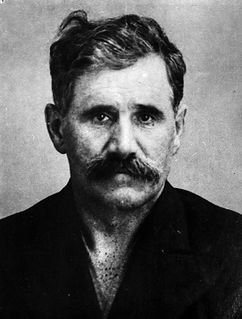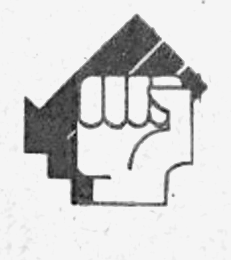 W
WThe Right Opposition or Right Tendency, in VKP(b) was a conditional label formulated by Stalin in fall of 1928 in regards the opposition against certain measures included within the first five-year plan by Nikolai Bukharin, Alexei Rykov, Mikhail Tomsky and their supporters within the Soviet Union that did not follow the so called "general line of the party". It is also the name given to "right-wing" critics within the Communist movement internationally, particularly those who coalesced in the International Communist Opposition, regardless of whether they identified with Bukharin and Rykov.
 W
WNikolai Ivanovich Bukharin was a Bolshevik revolutionary, Soviet politician, Marxist philosopher and economist and prolific author on revolutionary theory.
 W
WThe Communist Party of Germany (Opposition), generally abbreviated as KPO or KPD(O), was a communist opposition organisation established at the end of 1928 and maintaining its existence until 1939 or 1940. After the rise of Adolf Hitler and the Nazi Party to power in January 1933, the KPO existed only as an illegal and underground organization. The group initially sought to modify, later to replace, the mainstream Communist Party of Germany (KPD) headed by Ernst Thälmann. The KPO was the first national section affiliated to the International Communist Opposition (ICO).
 W
WBenjamin "Ben" Gitlow was a prominent American socialist politician of the early 20th century and a founding member of the Communist Party USA. During the end of the 1930s, Gitlow turned to conservatism and wrote two sensational exposés of American Communism, books which were very influential during the McCarthy period. Gitlow remained a leading anti-communist up to the time of his death.
 W
WWilliam Herberg was an American writer, intellectual and scholar. A communist political activist during his early years, Herberg gained wider public recognition as a social philosopher and sociologist of religion, as well as a Jewish theologian. He was a leading conservative thinker during 1950s and an important contributor to the National Review magazine.
 W
WJay Lovestone was an American activist. He was at various times a member of the Socialist Party of America, a leader of the Communist Party USA, leader of a small oppositionist party, an anti-Communist and Central Intelligence Agency (CIA) helper, and foreign policy advisor to the leadership of the AFL-CIO and various unions within it.
 W
WThe Lovestoneites, led by former General Secretary of the Communist Party USA (CPUSA) Jay Lovestone, were a small American oppositionist Communist movement of the 1930s. The organization emerged from a factional fight in the CPUSA in 1929 and unsuccessfully sought to reintegrate with that organization for several years.
 W
WThe Workers' Party of Marxist Unification was a Spanish communist political party formed during the Second Republic and mainly active around the Spanish Civil War. It was formed by the fusion of the Trotskyist Communist Left of Spain and the Workers and Peasants' Bloc against the will of Leon Trotsky, with whom the former broke. The writer George Orwell served with the party's militia and witnessed the Stalinist repression of the movement, which would help form his anti-authoritarian ideas in later life, and motivated him to cooperate with the British Foreign Office in anti-communist propaganda activities.
 W
WManabendra Nath Roy, born Narendra Nath Bhattacharya, was an Indian revolutionary, radical activist and political theorist, as well as a noted philosopher in the 20th century. Roy was a founder of the Mexican Communist Party and the Communist Party of India. He was also a delegate to congresses of the Communist International and Russia's aide to China. Following the rise of Joseph Stalin, Roy left the mainline communist movement to pursue an independent radical politics. In 1940 Vinay Roy was instrumental in the formation of the Radical Democratic Party, an organisation in which he played a leading role for much of the decade of the 1940s.
 W
WAlexei Ivanovich Rykov was a Russian Bolshevik revolutionary and a Soviet politician and statesman, most prominent as premier of Russia and the Soviet Union from 1924 to 1929 and 1924 to 1930 respectively. He was one of the accused in Joseph Stalin's show trials during the Great Purge.
 W
WThe Socialist Party, was a political party in Sweden active from 1929 to 1948. Led by Karl Kilbom and Nils Flyg, the party was founded in 1929 as a splinter group of the Communist Party of Sweden. Until 1934, the splinter group used the same name Communist Party of Sweden, so in order to keep the two factions apart, this faction was generally known as Kilbommare ("Kilbomians") while those who stayed in the old party were known as Sillénare.
 W
WAugust Thalheimer was a German Marxist activist and theorist.
 W
WMikhail Pavlovich Tomsky was a factory worker, trade unionist and Bolshevik leader and Soviet politician. He was the Chairman of the All-Union Central Council of Trade Unions in the 1920s.
 W
WNikolai Aleksandrovich Uglanov was a Russian Bolshevik politician and Soviet statesman who played an important role in the government of the Soviet Union as a Communist Party leader in the city of Moscow during the 1920s. Uglanov was closely associated with the so-called "Right Deviation" associated with Soviet party leader Nikolai Bukharin and he fell from his leadership position during the mass collectivization campaign of 1929. Uglanov was arrested in the summer of 1936 and was executed the following spring during the secret police terror of 1937–38.
 W
WBertram David "Bert" Wolfe was an American scholar and former communist best known for biographical studies of Vladimir Lenin, Joseph Stalin, Leon Trotsky, and Diego Rivera.
 W
WThe Workers and Peasants' Socialist Party was an ephemeral socialist organisation in France, formed on June 8, 1938 by Marceau Pivert. Its youth wing was the Workers and Peasants' Socialist Youth.
 W
WCharles S. "Sasha" Zimmerman (1896–1983) was an American socialist activist and trade union leader, who was an associate of Jay Lovestone. Zimmerman had a career spanning five decades as an official of the International Ladies Garment Workers Union. During the early 1970s, Zimmerman and Bayard Rustin were national Co-Chairmen the Socialist Party of America and the Social Democrats USA.